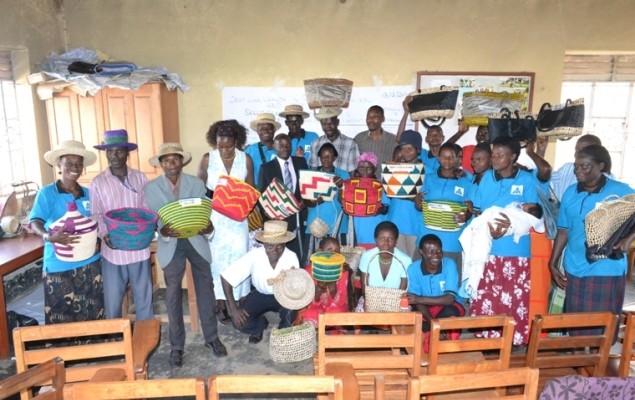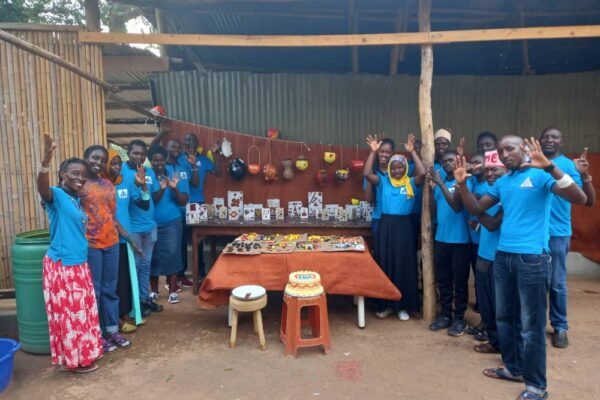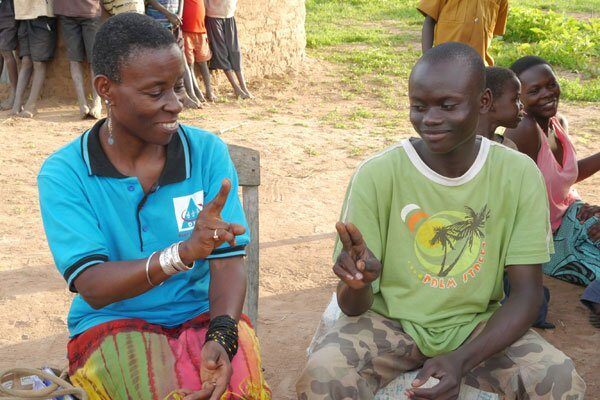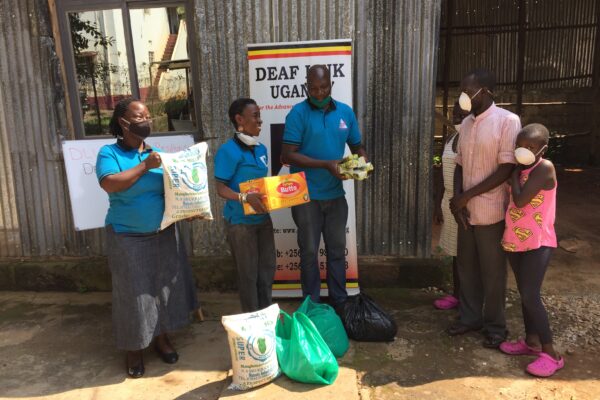How old was your child when you realised she was deaf?
She was about 3 years old – but at that time she wasn’t staying with me. She came to live with me permanently when she was 6 years old.
What was your reaction when you realised she was deaf?
Confusion! All family members had many questions. Already there were two deaf children in the family, Flavia was the third. We wondered why these children were deaf? But my father being a Christian, believed it was God’s plan. Deafness created stigma, even for me. In the early days of my marriage, I feared to inform my husband that I had deaf children in my family, because I knew it’d cause problems. Stigma is very negative as it creates social problems: You’re afraid that if people know they will isolate you. But later on, I didn’t care anymore what people thought and decided to embrace my daughter, showering her with a lot of care. I felt that since she was in my care, I must be the first person to love her.
How did the family react towards her deafness?
I had young children who were the same age as Flavia. Children have such beautiful innocence, they all interacted well with Flavia and loved her so much – their childhood was happy. Flavia was a sociable child, she got on well with everyone, which made it for the family. There was no difference among my children, they were all equal: deaf or not deaf!
What were the main challenges you experience in raising your child?
Communication. This was the biggest challenge. I’d send my hearing daughters to shops but was terrified of sending Flavia, because I thought she’d be knocked down by a car and would be in danger. At times I had a very strong urge to hide her away, but couldn’t because she was extremely sociable: she’d go to the neighbours and moved about freely, it was impossible to restrict her!
So I overcame my personal fears and decided to expose her to the world. I went to the shops and market with her and would give her a list of things to buy – eventually, she learnt and started going to the market by herself. Her shopping was far much better than her hearing cousins! She is naturally gifted and would negotiate prices and selected the best produce: tomatoes, onions, carrots, etc.
How do you communicate with your child?
In the early days before I learn Sign Language I used pictures and drawings to communicate with Flavia. When relatives came home, she would ask me who they are and I’d draw a family tree to explain our family relations. When she began puberty, I explained everything through drawings. She equally explained her school experiences at Mumias School for the Deaf in Kenya, using drawings. I understood everything she told me!
What advice would you give to parents of deaf children who have just learnt that thier child is deaf?
At least some family members should endeavour to learn Sign Language, especially parents, should an opportunity arise. Otherwise, I advise parents to invent ‘home signs’ or gestures that they can use with thier deaf child at home for daily interaction. Make up local signs BUT NEVER speak to a deaf child, because it’s insulting to them as they can’t hear you! It’s so easy to understand gestures: “DO AS” because everything is visual. Gestures can help the child and parents form a strong bond.
Later on when the child begins school, she/he can refine home gestures when they get exposure to Sign Language – they will bring this language back home. At school the child builds her/his sign language vocabulary, just like a hearing child begins to speak – you may not clearly understand, but you’ll easily predict what a child is saying until they finally learn how to speak fluently. Parents should inform the family that the child is deaf but that can communicate visually. Building a deaf child’s relationships should begin from home because it is within this family environment that a child builds self-confidence and a sense of belonging. Do not isolate your child – it is detrimental to thier mental welfare.
Recently a mother of a deaf girl called me in anguish. Her daughter took the family album and cut herself out in each of the photograph she was appearing! She then took a pair of scissors and cut up her mother’s clothes. Such an act is an expression of feeling unwanted. She felt a stranger to the family unit and unfortunately this is how she expressed herself. The mother called me for help and I took Flavia with me. Flavia counselled the girl in a way that no professional hearing counsellor would have done! It was the best counselling I’ve ever seen. The girl understood everything Flavia shared with her.
What are your future hopes for your child?
Flavia is now a married woman – mother to a 2 year old son! She owns and manages her business as well as working full time in a bank. Just like my elder sister, who is now retired and works with her two deaf daughters, I’m extremely privileged to have raised Flavia! I wish happiness for Flavia and also hope that one day she’ll get out of employment into full time self-employment so as to expand her existing Fashion Business: FLANCY DESIGNS. As a role model for deaf women, Flavia is very capable of using her experience to impart skills to other deaf girls and also counsel them on life issues such as, puberty, relationships, etc.
How has DLU assisted your child and family?
Flavia has benefitted greatly from DLU’s micro-credit project to the extent that she borrowed three million for her knitting business! This is proof that she’s an exemplary entrepreneur, capable of managing large sums of money! It’s so impressive that she can independently manage her business. Over the years, she’s acquired positive management skills which she can also pass on to other deaf females keen on starting thier own business.
Years ago when she had just started her fashion business, I’d taught her how to price her products, explaining the importance of knowing how much money she spent on buying raw materials, so that she could price finished products accordingly. DLU is enabling her to spread her wings!
Could you advice how DLU can better support the deaf in 2013
Most importantly DLU should equip deaf females with vocational skills so that in future young deaf girls have opportunities for self-employment. I meet many grown deaf women who have never been to school and also have no vocational skills. They are often exploited sexually, can’t find gainful employment and are solely depend on families that refuse to support them. Therefore DLU can help set up programmes to equip deaf females with skills.




